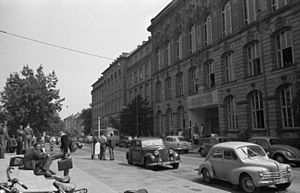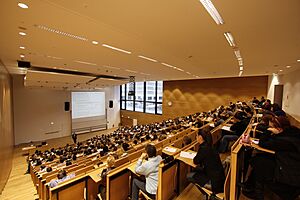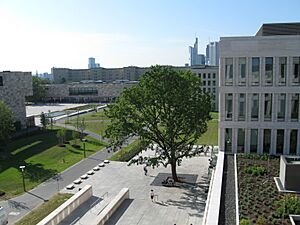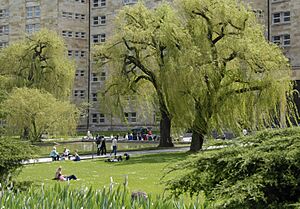Goethe University Frankfurt facts for kids
|
Johann Wolfgang Goethe-Universität Frankfurt am Main
|
|
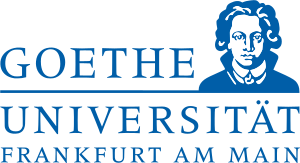 |
|
|
Former name
|
Königliche Universität zu Frankfurt am Main |
|---|---|
| Type | Public |
| Established | 18 October 1914 The Goethe University has roots dating back to 1484, the year in which the current "Johann Christian Senckenberg University Library" was founded. |
| Budget | €715.3 million(2020) |
| Chancellor | Albrecht Fester |
| President | Enrico Schleiff |
| Vice-president | Bernhard Brüne, Michael Huth, Christiane Thompson, Ulrich Schielein |
|
Academic staff
|
3,631.8 (FTE, 2020) |
|
Administrative staff
|
2,082.9 (FTE, 2020) |
| Students | 42,355 (2022) |
| Undergraduates | 19,329 (2022) |
| Postgraduates | 6,816 (2022) |
| 1,213 (2022) | |
|
Other students
|
5,940 (teacher education) (2022) |
| Address |
Campus Westend:
,
,
,
Theodor-W.-Adorno-Platz 1 60323
,
Germany
50°7′40″N 8°40′00″E / 50.12778°N 8.66667°E |
| Campus | Multiple sites |
| Language | German, English |
| Colours | Blue |
| Affiliations | U15 |
Goethe University Frankfurt is a large public research university in Frankfurt am Main, Germany. It was started in 1914. It was special because it was funded by wealthy citizens of Frankfurt, not just the government. This is why it was called a "citizens' university."
In 1932, the university was named after Johann Wolfgang von Goethe. He was a famous poet, writer, and philosopher from Frankfurt. Today, about 48,000 students attend the university. They study at four main campuses across the city.
The university celebrated its 100th birthday in 2014. Many famous people have been connected to Goethe University. This includes 20 Nobel Prize winners and 18 winners of the Gottfried Wilhelm Leibniz Prize. Goethe University is also part of important research groups like the Rhine-Main-Universities.
Contents
History of Goethe University
The university's history goes back to 1484. That's when a city library was created from a gift. This library later became the university library in 1914. In some countries, this earlier date would be considered the founding year. However, in Germany, a university's founding year is when it gets the right to give out doctoral degrees.
The modern university officially began on September 28, 1912. That's when the agreement to create the "Royal University at Frankfurt on the Main" was signed. The king approved the university on June 10, 1914. Students started enrolling on October 16, 1914. Many wealthy families and business owners from Frankfurt's Jewish community helped pay for two-thirds of the university's starting money.
The university became well-known for its Institute for Social Research, started in 1923. This was the home of the Frankfurt School, a famous group of thinkers in philosophy and social studies. Important scholars like Theodor Adorno, Max Horkheimer, and Jürgen Habermas were part of this group.
Goethe University has also been important in science and medicine. Nobel Prize winners like Max von Laue and Max Born worked here. They made big discoveries, such as the Stern–Gerlach experiment. In recent years, the university has focused on law, history, and economics. It aims to be a top university for finance and economics in Germany. This is because it is close to one of Europe's biggest financial centers.
How the University is Organized
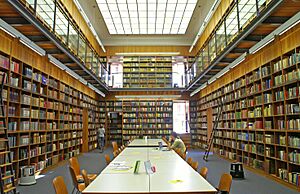
Goethe University has 16 different faculties, which are like departments or colleges. Each faculty focuses on a specific area of study:
- Law
- Economics and Business Administration
- Social Sciences
- Educational Sciences
- Psychology and Sports Sciences
- Protestant Theology
- Catholic Theology
- Philosophy and History
- Linguistics, Cultures, and Arts
- Modern Languages
- Geosciences and Geography
- Computer Science and Mathematics
- Physics
- Biochemistry, Chemistry and Pharmacy
- Biological Sciences
- Medical Science
The university also works with several research institutes. These include the Max Planck Institute of Biophysics and the Max Planck Institute for Brain Research.
University Campuses
Goethe University has four main campuses located in different parts of Frankfurt am Main:
Campus Westend: Main Location
The Westend Campus is the main campus. The university's leadership is located here. It includes the famous IG Farben Building and many new buildings. The House of Finance and the main lecture hall building are also here. Most departments, except for Medicine and Natural Sciences, are now located on this campus.
The IG Farben Building is a very important part of Campus Westend. It was built in a modern style. After the university took over the building in the 1990s, new buildings were added. The House of Finance moved into a new building in 2008. This building was designed to match the style of the IG Farben Building. It has lecture halls, study rooms, and a library.
Campus Bockenheim: Former Center
The Bockenheim campus used to be the main center of the university. It still has parts of the language and cultural sciences, computer science, and mathematics departments. The main university library, Johann Christian Senckenberg, is also here. The buildings on this campus were built between the 1950s and 1970s.
Campus Riedberg: Science Hub
The Riedberg campus has university buildings built since the 1970s. It is home to the departments of Physics, Biochemistry, Chemistry, Pharmacy, Biological Sciences, and Earth Sciences. It also has a science garden and a large lecture hall center.
Campus Niederrad: Medical Facilities
The Niederrad campus is where the University Hospital is located. It also houses the Department of Medicine. This campus has buildings that have grown over time since the 19th century, along with modern facilities.
Campus Ginnheim: Sports and Recreation
Campus Ginnheim is where the university's sports facilities are. It has athletics grounds, tennis courts, volleyball courts, and sports halls. The University Sports Centre is also here. Many classes for physical education and sports psychology are taught at Ginnheim.
The university is planning to have mostly three main campuses in the future. This means some departments from Bockenheim will move to other campuses. The sports grounds in Ginnheim will stay.
Student Groups and Activities
Students at Goethe University can join many different groups and initiatives. These groups help students get involved in university life and connect with others.
Political Student Groups
Students interested in politics can join various university groups. These groups represent different political ideas and work to make changes within the university. Examples include:
- DGB Hochschulgruppe Frankfurt am Main
- DieLinke.SDS
- Grüne Hochschulgruppe
- JUSO Politische Hochschulgruppe Frankfurt
- RCDS Frankfurt
Other Student Groups and Initiatives
Beyond politics, there are many other student groups and initiatives. They cover a wide range of interests:
- AIESEC (an international youth organization)
- Amnesty International, Hochschulgruppe Frankfurt
- Campusradio DauerWelle (the university radio station)
- Debattierclub Goethes Faust (a debate club)
- Erasmus Student Network Frankfurt am Main (for exchange students)
- European Law Students' Association Frankfurt am Main
- Goethe's Green Office (focuses on sustainability)
- ROCK YOUR LIFE! Frankfurt e. V. (mentoring program)
- Studieren ohne Grenzen Frankfurt (supports students in conflict zones)
Student Councils
Student councils at Goethe University are official bodies. They are set up by law to represent students' interests within the university. They are not just informal groups.
Notable People from Goethe University
Many important people have studied or worked at Goethe University.
Famous Alumni
- Theodor W. Adorno (1903–1969), a philosopher and sociologist from the Frankfurt School.
- Max Horkheimer, another key member of the Frankfurt School.
- Jürgen Habermas, a well-known sociologist and philosopher.
- Hans Bethe, a theoretical physicist who won the Nobel Prize in 1967.
- Max Born, a theoretical physicist and mathematician who won the Nobel Prize in 1954.
- Paul Ehrlich, a Nobel Prize winner in 1908 for medicine.
- Walter Hallstein (1901–1982), the first president of the European Commission.
- Nancy Faeser, a German politician.
Nobel Prize Winners Connected to the University
Goethe University has a strong connection to many Nobel Prize winners. Here are some of them:
- Paul Ehrlich: 1908 Nobel Prize for Physiology or Medicine
- Max von Laue: 1914 Nobel Prize for Physics
- Otto Loewi: 1914 Nobel Prize for Physiology or Medicine
- Max Born: 1954 Nobel Prize for Physics
- Alexander Robertus Todd: 1957 Nobel Prize for Chemistry
- Hans Bethe: 1967 Nobel Prize for Physics
- Reinhard Selten: 1994 Nobel Prize for Economics
- Christiane Nüsslein-Volhard: 1995 Nobel Prize for Physiology or Medicine
- Peter Grünberg: 2007 Nobel Prize for Physics
- Benjamin List: 2021 Nobel Prize for Chemistry
University Rankings
| University rankings | ||||||||||
|---|---|---|---|---|---|---|---|---|---|---|
| Overall – Global & National | ||||||||||
|
||||||||||
Goethe University is recognized as a top university worldwide. In 2024, the QS World University Rankings placed it 302nd globally and 18th in Germany. The Times Higher Education World University Rankings for 2024 ranked it between 201st and 250th internationally. It was ranked even higher in Germany by the Academic Ranking of World Universities (ARWU) in 2023, placing 6th to 9th nationally.
In 2012, The New York Times also listed Goethe University among the top 10 universities worldwide preferred by employers.
Places to See
- Botanischer Garten der Goethe-Universität Frankfurt am Main, a beautiful botanical garden.
- IG Farben Building, a famous building on Campus Westend.
See also
 In Spanish: Universidad Johann Wolfgang Goethe para niños
In Spanish: Universidad Johann Wolfgang Goethe para niños
- Center for Financial Studies
- Frankfurt University Library
- House of Finance


